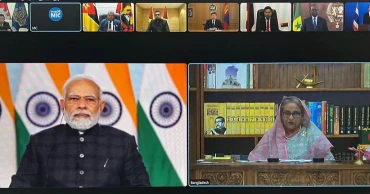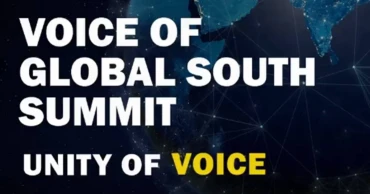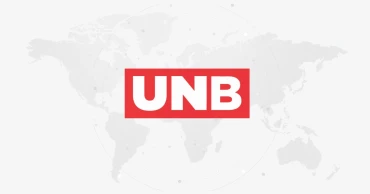Global South
Modi calls on leaders of Global South to unitedly forge a common agenda for its own development
At the Voice of the Glocal South Summit hosted virtually by India on Thursday, Prime Minister of India, Narendra Modi called on leaders of the Global South to unitedly forge a common agenda for its own development and for the three-fourth of humanity that lives in it.
Bangladesh, represented by Prime Minister Sheikh Hasina, was invited to the inaugural session where world leaders shared their country’s views.
She thanked the Indian government for inviting Bangladesh to this important summit that would provide it a unique opportunity to engage with counterparts world over.
Read more: Modi rolls out 5G mobile internet services in India
PM Hasina warmly congratulated Indian Prime Minister Narendra Modi and the government of India on assumption of G20 Presidency and added that Bangladesh welcomes India's vision as the President of G20 to ensure inclusive development under the theme, "One Earth, One Family, One Future".
PM Modi spoke of the Global South as a united entity with the greatest stakes in the future and added that India has always stood for the greater role of developing countries in determining our common future.
To reshape the global emerging order, he called for an equivalent voice of the Global South.
To redesign global political and financial governance, remove inequities, enlarge opportunities, support growth and spread progress and prosperity, he called for simple, scalable and sustainable solutions to transform the Global South and proposed a 4R strategy - ‘Respond, Recognize, Respect and Reform’: Respond to the priorities of the Global South by framing an inclusive and balanced international agenda; Recognize that the principle of ‘Common but Differentiated Responsibilities’ applies to all global challenges; Respect sovereignty of all nations, rule of law and peaceful resolution of differences and disputes; and Reform international institutions, including the United Nations, to make them more relevant.
Human-centric development came out as an-important important priority from all the world leaders.
Read more: India’s G20 agenda to be inclusive, ambitious, action-oriented, decisive: Modi
3 years ago
India to host "Voice of Global South Summit" January 12-13 virtually under theme "Unity of Voice, Unity of Purpose”
India will host a special virtual Summit on 12-13 January 2023 in a new and unique initiative.
This "Voice of Global South Summit” under the theme "Unity of Voice, Unity of Purpose” envisages bringing together countries of the Global South to share their perspectives and priorities on a common platform.
More than 120 countries are being invited to participate in this Summit, said the Ministry of External Affairs on Friday.
The initiative is inspired by Indian Prime Minister Narendra Modi’s vision of Sabka Saath, Sabka Vikas, Sabka Vishwas and Sabka Prayas, and is underpinned by India’s philosophy of Vasudhaiva Kutumbakam.
India will work to ensure that the valuable inputs generated from partner countries in the Voice of Global South Summit deliberations receive due cognizance globally.
Further, India’s ongoing Presidency of the G20 provides a special and strong opportunity for those countries that are not part of the G20 process to share their ideas and expectations from the G20, according to the MEA.
This is in line with Prime Minister’s statement that India’s G20 Presidency will be shaped in consultation with not just our G20 partners, but also our fellow-travellers in the Global South, whose voice often goes unheard.
The Summit envisages ten sessions.
Four sessions would be held on 12 January, and six sessions on 13 January.
Read more: G20 Presidency: India to invite Bangladesh as guest country
Each session is expected to witness the participation of Leaders/Ministers from 10-20 countries.
The inaugural and concluding sessions would be at Head of State / Government level, and hosted by the Prime Minister.
The theme of the Inaugural Leaders’ session is "Voice of Global South - for Human-Centric Development” and that of the Concluding Leaders’ session is "Unity of Voice-Unity of Purpose”.
In addition, there would be 8 Ministerial sessions, with the following themes:
• Finance Ministers’ Session on "Financing People-Centric Development”
• Environment Ministers’ Session on "Balancing Growth with Environment Friendly Lifestyles (LiFE)”
• Foreign Ministers’ Session on "Priorities of the Global South - Ensuring a Conducive Environment”
• Energy Ministers’ Session on "Energy Security and Development- Roadmap to Prosperity”
• Health Ministers’ Session on "Cooperation to Build Resilient Healthcare Systems”
• Education Ministers’ Session on "Human Resource Development and Capacity Building”
• Commerce and Trade Ministers’ Session on "Developing Synergies in the Global South - Trade, Technology, Tourism and Resources”
• Foreign Ministers’ Session on "G-20: Suggestions for India’s Presidency”.
Read more: UN Resident Coordinator stresses urgency of fighting climate change
3 years ago
South-South cooperation: Hasina for setting up ‘Knowledge Centre’ in Bangladesh
Prime Minister Sheikh Hasina on Friday sought international support for setting up a ‘South-South Knowledge and Innovation Centre’ in Bangladesh to act as a platform of technological solutions to development challenges in the Global South.
“In 2019, Bangladesh offered to set up a ‘South-South Knowledge and Innovation Centre’. It would ideally serve as a platform for co-creating technological solutions to development challenges in the South. I urge the UN, G20 and OECD to consider investing in such forward-looking proposals,” she said.
The Prime Minister made the call while addressing the 4th Edition of Paris Peace Forum at Grande Halle de la Villette here.
READ: Hasina urges UNESCO to declare online and remote learning as public good
“On the home front, as Bangladesh graduates from the LDC status, we aim to work on setting up our own platform for international economic and technical cooperation. The platform will help coordinate and expand the work of our value-based diplomacy, and the multiple ways it contributes to international development, peacekeeping and humanitarian efforts,” she said.
Sheikh Hasina said many developed countries still fall behind their internationally agreed development commitments. “For them (developed countries), supporting South-South development cooperation programmes can be one way of realizing their own commitments,” she said.
Hasina said Bangladesh has always taken up the cause of the world’s least developed countries. “We’re now serving as the voice of climate vulnerable countries. Our commitment to the Global South is a long-standing and proven one,” she added.
The PM noted that the idea of South-South cooperation is for more than four decades. It has found its place in the 2030 Agenda for Sustainable Development. South-South cooperation initiatives have been on the rise in recent years. Many of them stand out for their creative development solutions, she said.
READ: Hasina invites French entrepreneurs to invest in Bangladesh
But South-South cooperation tends to take a backseat in international development discourse. It has been hard to change the traditional thinking and narratives around international development cooperation, she said.
“As such, many potential South-South cooperation projects remain under-funded. The idea of triangular cooperation has not lived up to its potential. This gap needs to be addressed. There’re some compelling reasons for that,” the PM added.
Hasina said a good number of homegrown development solutions are already available in the Global South. With additional financing, many of these solutions can be implemented and scaled up across other developing countries. “This can help avoid re-invent the solution in the name of technical assistance,” she said.
Hasina said there are better chances for South-South cooperation to respond directly to national development priorities. The financing and technological support of the North can help enhance the transparency and cost-effectiveness of South-South cooperation programmes, she added.
“We now witness an uneven response to globalization around the world. During the Covid-19 pandemic, we’ve seen the international governance system failing millions of people in the Global South. The huge gap in access to vaccines and treatments is only too telling,” she noted.
The Prime Minister said a number of developing countries like Bangladesh have the capacity to ensure vaccine equity and quality. “We need support with technical know-how or TRIPS waiver to go into large-scale vaccine production for sharing vaccines with the rest of the world,” Hasina said.
“From Bangladesh, we’ve been reaching out to a number of our friendly countries with emergency medical supplies and other provisions during the pandemic. In one case, we sent out our trained workforce to administer the vaccines,” she said.
She said Bangladesh has been working on sharing its own development experience with other countries for many years now.
“Our achievements in agriculture, community healthcare, non-formal education, reproductive health, disaster management and micro-finance have reached out in other parts of the world. Building on our work in the last twenty years, we’ve offered to engage in humanitarian assistance for the brotherly Afghan people under UN initiatives,” the PM said.
“We’ve also been contributing to human resource development over the years for some of our neighbouring countries,” Hasina said.
With UNDP’s support, Bangladesh’s work on community-level digital services and public service innovations is being shared with a number of countries in the Global South. “Some of our climate adaptation methods are gaining increased attention in the North,” she said.
4 years ago





